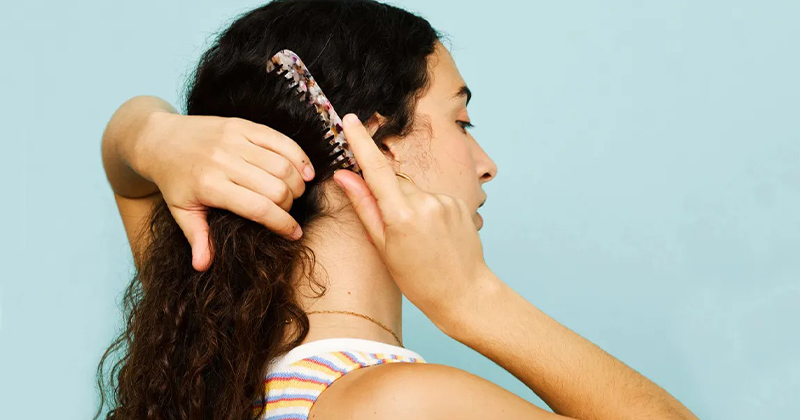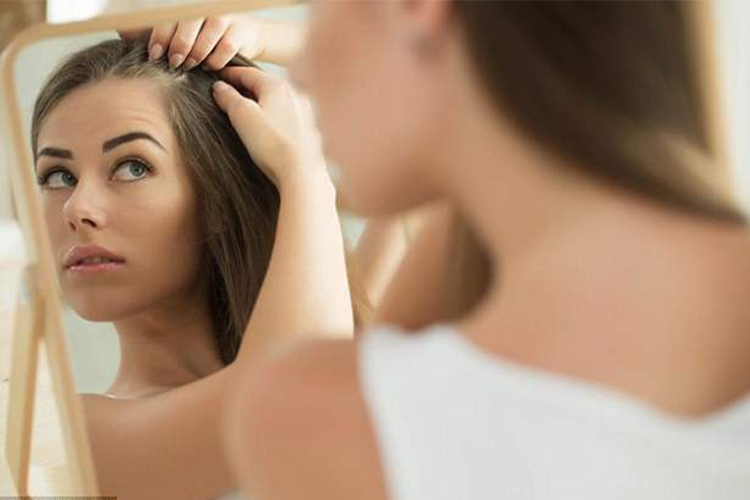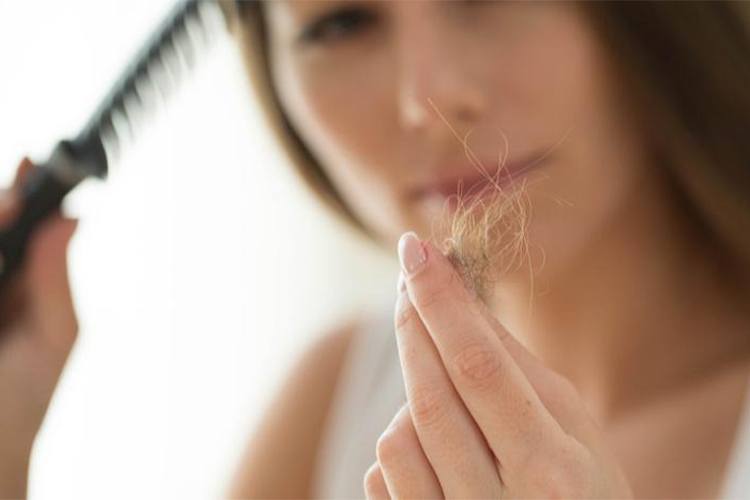
The impact of diet on hair health
When it comes to maintaining healthy hair, we often turn to various hair care products and treatments. However, many people overlook the crucial role that diet plays in promoting strong and vibrant hair. The saying “you are what you eat” holds true when it comes to our hair, as the nutrients we consume can significantly impact its health and appearance. In this article, we will explore the relationship between diet and hair health, and how you can make dietary choices that support luscious locks.

Protein: The Building Block of Hair
One of the essential components for healthy hair is protein. Hair strands are predominantly made of a protein called keratin. Consuming an adequate amount of protein in your diet ensures that your body has the necessary building blocks to produce strong and resilient hair. Good sources of protein include lean meats, fish, eggs, legumes, and dairy products. If you follow a vegetarian or vegan diet, make sure to include plant-based protein sources such as tofu, tempeh, quinoa, and lentils.
Vitamins and Minerals for Hair Health
Several vitamins and minerals play a vital role in maintaining healthy hair. Here are some key nutrients to focus on:
Vitamin A: This vitamin helps the body produce sebum, a natural oil that moisturizes the scalp and keeps hair healthy. Incorporate foods like carrots, sweet potatoes, spinach, and kale, which are rich in vitamin A.
B Vitamins: Biotin, niacin, and cobalamin (vitamin B12) are particularly important for hair health. Biotin, in particular, is often associated with hair growth and can be found in foods like eggs, nuts, and whole grains. Vitamin B12, which is primarily found in animal products, is crucial for healthy red blood cells, which supply oxygen to the hair follicles.
Vitamin C: As a powerful antioxidant, vitamin C helps protect the hair from damage caused by free radicals. Citrus fruits, strawberries, bell peppers, and broccoli are excellent sources of vitamin C.
Iron: Iron deficiency can lead to hair loss, so it’s essential to consume iron-rich foods such as lean meats, fish, legumes, and leafy green vegetables. Pairing iron-rich foods with vitamin C sources enhances iron absorption.
Zinc: Zinc is vital for hair tissue growth and repair. Incorporate foods like oysters, beef, pumpkin seeds, and lentils into your diet to ensure adequate zinc intake.
Omega-3 Fatty Acids for Scalp Health
Omega-3 fatty acids are known for their anti-inflammatory properties and play a crucial role in maintaining a healthy scalp. A healthy scalp provides a fertile environment for hair growth. Foods rich in omega-3 fatty acids include fatty fish like salmon, sardines, and mackerel, as well as flaxseeds, chia seeds, and walnuts.
Hydration and Hair Moisture
Staying hydrated is essential for overall health, including the health of your hair. Dehydration can lead to dry and brittle hair, so make sure to drink an adequate amount of water each day. Additionally, consuming water-rich foods like fruits and vegetables can contribute to your hydration levels.

The Downside of Unhealthy Diets
Just as a healthy diet can promote hair health, an unhealthy diet can have a detrimental effect on your hair. Excessive consumption of processed foods, sugary snacks, and drinks can lead to nutrient deficiencies and affect hair quality. Crash diets and extreme weight loss regimens may also cause hair loss or thinning due to a lack of essential nutrients.
Here are a few more suggestions to help your diet maintain healthy hair
Include antioxidant-rich foods:
Antioxidants help protect hair follicles from damage caused by free radicals. Incorporate foods like berries, dark chocolate, green tea, and colorful fruits and vegetables into your diet to boost your antioxidant intake.
Avoid excessive alcohol and caffeine:
Excessive alcohol consumption and high caffeine intake can dehydrate the body and potentially affect hair health. Moderation is key, so be mindful of your alcohol and caffeine consumption and ensure you stay adequately hydrated.
Limit processed and sugary foods:
Processed foods and those high in added sugars can contribute to inflammation in the body, potentially impacting hair health. Opt for whole, unprocessed foods whenever possible and choose natural sweeteners like honey or maple syrup instead of refined sugars.
Consider collagen-rich foods:
Collagen is a protein that provides structural support to the hair. Including collagen-rich foods such as bone broth, chicken, fish, and citrus fruits, which contain vitamin C for collagen synthesis, may promote hair strength and growth.
Pay attention to your gut health:
The health of your gut can impact nutrient absorption and overall well-being, including hair health. Consume probiotic-rich foods like yogurt, sauerkraut, and kefir, or consider taking a high-quality probiotic supplement to support a healthy gut.
Don't skip meals:
Regularly skipping meals or following restrictive diets can deprive your body of essential nutrients necessary for healthy hair. Aim to eat balanced meals throughout the day to ensure a steady supply of nutrients.
Stay hydrated:
Dehydration can lead to dry and brittle hair. Make sure to drink an adequate amount of water daily to keep your body and hair well-hydrated.
Emphasize nutrient-dense foods:
Opt for nutrient-dense foods that provide a wide array of vitamins, minerals, and antioxidants. Include leafy greens, colorful fruits and vegetables, nuts, seeds, and whole grains in your meals to ensure a well-rounded nutrient intake.
Prioritize healthy fats:
Healthy fats, such as those found in avocados, nuts, seeds, and fatty fish, are essential for maintaining a healthy scalp and promoting shiny hair. Incorporate these foods into your diet to provide essential fatty acids that nourish your hair follicles.

Include sulfur-rich foods:
Sulfur is an important mineral for hair health as it helps to promote collagen and keratin production. Include sulfur-rich foods like onions, garlic, cruciferous vegetables (broccoli, cauliflower, cabbage), and eggs in your diet.
Consider herbal remedies:
Lorem ipsum dolor sit amet, consectetur adipiscing elit. Ut elit tellus, luctus nec ullamcorper mattis, pulvinar dapibus
Certain herbs and herbal supplements are believed to promote hair health. For example, saw palmetto, horsetail extract, and ginseng are thought to support hair growth. Before incorporating any herbal remedies, consult with a healthcare professional to ensure they are safe for you and will not interact with any medications you may be taking.
.
Be mindful of iron absorption:
Iron deficiency can lead to hair loss, but it’s important to note that the type of iron you consume affects its absorption. Pair iron-rich foods with vitamin C sources to enhance iron absorption. For example, combine a spinach salad with citrus fruits or include bell peppers with your lean meat or tofu stir-fry.
Practice portion control:
Maintaining a healthy weight is beneficial for overall health, including hair health. Excessive weight gain or weight loss can disrupt the hair growth cycle. Focus on portion control and aim for a balanced approach to weight management.
Consider supplements:
While it’s best to obtain nutrients from whole foods, in some cases, dietary supplements may be beneficial. Biotin and collagen supplements are popular options that are believed to support hair health. However, consult with a healthcare professional before starting any supplements to determine if they are appropriate for you and to ensure they won’t interfere with any existing medical conditions or medications.
Reduce refined carbohydrates:
Diets high in refined carbohydrates and sugars can lead to inflammation and insulin resistance, which may contribute to hair problems. Minimize your intake of processed foods, sugary snacks, and beverages to support overall hair health.
Incorporate herbs and spices:
Certain herbs and spices are known to promote hair health. Rosemary, for example, is believed to stimulate hair growth, while fenugreek seeds can help strengthen hair follicles. Consider adding these herbs and spices to your meals or preparing herbal infusions for hair rinses.
Stay consistent with healthy eating:
Consistency is key when it comes to the impact of diet on hair health. Maintain a balanced and nutritious diet over the long term to provide sustained nourishment to your hair follicles.
Avoid crash diets:
Crash diets or extreme calorie restriction can lead to nutrient deficiencies, which may result in hair loss or thinning. Opt for a balanced and sustainable approach to weight management instead of drastic measures that can negatively impact your hair.
Be mindful of food intolerances or allergies:
Food intolerances or allergies can trigger inflammatory responses in the body, potentially affecting hair health. If you suspect you have any food sensitivities, consider working with a healthcare professional to identify and manage them.
Consider collagen supplementation:
Collagen is a protein that supports hair structure and growth. Collagen supplements, such as collagen peptides, are widely available and may help improve hair health. Consult with a healthcare professional to determine the appropriate dosage and suitability for you.
Manage stress levels:
Chronic stress can impact hair health by disrupting the hair growth cycle. Incorporate stress management techniques such as exercise, meditation, or engaging in hobbies to reduce stress levels and promote overall well-being, including hair health.
Seek professional advice:
If you have specific concerns about your hair health, it’s best to consult with a healthcare professional, such as a dermatologist or a registered dietitian. They can assess your individual needs, conduct any necessary tests, and provide personalized guidance tailored to your situation.
Remember, the impact of diet on hair health is a long-term process, and results may vary depending on individual factors. It’s important to adopt a holistic approach that combines a nutritious diet with proper hair care, regular exercise, and a healthy lifestyle to support optimal hair health.
